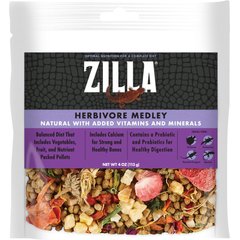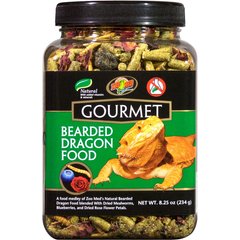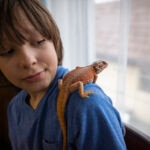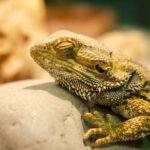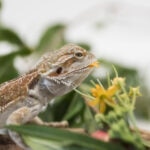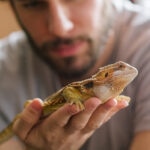Can Bearded Dragons Eat Strawberries?

Photo by Dylan Warren / iStock / Getty Images Plus
Bearded dragons are omnivorous reptiles who thrive on a varied diet of leaves, flowers, and crawling insects. But as you’re enjoying some fresh berries, you may be wondering, “Can bearded dragons eat strawberries too?” Yes!
While bearded dragons should get most of their nutrition from leafy greens and protein-rich insects, strawberries are perfectly fine to give your beardie in moderation.
Here’s everything you need to know about the benefits and potential risks of feeding strawberries to your bearded dragon, as well as how to safely share this sweet treat.
Before introducing any new food into your bearded dragon’s diet, always check with your veterinarian.
Are Strawberries Good for Bearded Dragons?
While your beardie may enjoy strawberries because of their sweet flavor, there are minimal health benefits. This is because strawberries aren’t an inherent part of a beardie’s wild diet.
That said, strawberries are:
- High in fiber: In moderation, the fiber in strawberries may help support digestive health.
- Rich in vitamin C: Vitamin C is an antioxidant that can promote overall health and support respiratory and joint health, according to Susan Tyson, VMD, veterinarian at Avian & Exotic Philly Vet in Philadelphia.
- High in moisture: Strawberries are about 90% water, so they can help with hydration.
The perks don’t end there, according to Cathy Johnson-Delaney, DVM, chair of the Welfare, Ethics, and Legislative Committee at the Association of Exotic Mammal Veterinarians and member-at-large of the Association of Reptile and Amphibian Veterinarians.
She says that because of their sweet, enticing flavor, strawberries can also be used:
- As a training treat
- To coax an ill beardie to eat its regular salad mix when they’re not feeling especially hungry
Recommended Product
Are Strawberries Bad for Bearded Dragons?
While strawberries aren’t a nutritional powerhouse, they aren’t inherently bad for bearded dragons, either. But there are some drawbacks, especially if you give your beardie too many, including:
- They’re high in phosphorus. Bearded dragons require a 2-to-1 ratio of calcium to phosphorus, and strawberries are higher in phosphorus than calcium. Without enough calcium, bearded dragons are more likely to develop hyperparathyroidism, a type of metabolic bone disease. While a small amount of strawberry likely won’t throw this ratio off significantly, too many (without enough extra calcium) comes with a higher risk of bone disease and paralysis.
- They’re high in carbohydrates and sugar. Compared to a beardie’s regular diet, strawberries are high in carbohydrates from sugar and low in protein. This can contribute to dental disease, weight gain, and imbalanced gut flora, according to Dr. Johnson-Delaney.
- They’re sweeter than their regular diet. Bearded dragons aren’t used to sugar. As such, the sweet taste can make your beardie very finicky or less likely to eat their regular diet.
- They’re low in preferred nutrients. Strawberries contain some vitamins and minerals, but they’re not a well-rounded food for a bearded dragon. If you give your bearded dragon strawberries in place of their regular diet, it can lead to malnourishment (especially if your beardie starts refusing their other food).
How Many Strawberries Can I Give My Beardie?
So, can bearded dragons have strawberries? Yes. But how many can they have?
Strawberries (and all other fruits) are considered treats to bearded dragons and should be fed in moderation, making up no more than 5% of your beardie’s daily diet. The rest should come from a well-balanced diet of vegetables and insects.
Dr. Johnson-Delaney recommends giving a healthy bearded dragon only one small piece of strawberry (the equivalent to the size of 1/4 teaspoon) one to three times per week, at most.
It’s best practice to feed them the top of the strawberry (the green part) with only a little bit of fruit attached, says Dr. Tyson. This can still give them the joy of a treat but with less sugar.
How To Safely Feed Strawberries to Bearded Dragons
In addition to limiting the portion size, there are some other guidelines you should follow to make sure you’re safely feeding your bearded dragon strawberries, including:
- Feed only fresh strawberries. Opt for fresh strawberries instead of frozen or canned, which often contain added sugar. Dr. Tyson also advises against dried or dehydrated strawberries due to a higher concentration of sugar.
- Watch for mold. Choose a firm strawberry that’s not squishy or moldy, because mold can make your beardie sick.
- Wash thoroughly. Make sure strawberries are washed with cool water to remove pesticides and contaminants, says Dr. Tyson.
- Remove the stem. While the leaves are OK, the stem can be hard to chew and digest.
- Cut the strawberry. Dr. Tyson recommends cutting the strawberry into small pieces to minimize the risk of choking. Their teeth can cut, but they’re not made for grinding fruits and veggies.
- Monitor your beardie. Your beardie is likely to gobble this treat right up but, if they haven’t eaten the strawberry within four to six hours, remove it from the cage or food dish. The heat of the cage can start fermentation and/or rot and bacterial growth, as well as insect colonization (think fruit flies!), according to Dr. Johnson-Delaney. It’s good practice to remove uneaten foods from your bearded dragon’s habitat every night anyway to prevent spoilage.
My Beardie Ate Too Many Strawberries—What Do I Do?
Despite your best efforts, your beardie may overindulge. And if that happens, it can cause:
- Diarrhea
- Gas
- Gut flora imbalance (imbalance of the healthy bacteria in the digestive system), which can lead to gastroenteritis (inflammation of the stomach and intestines)
If you notice any of these symptoms, stop feeding your bearded dragon strawberries and closely monitor them.
Mild symptoms will generally resolve on their own, but severe diarrhea and gastroenteritis will likely need treatment.
If your bearded dragon has severe or lingering symptoms, contact your vet for advice on what to do next.
What Other Fruits Can Bearded Dragons Eat?
So, in addition to strawberries, what fruits can bearded dragons eat?
While fruits should only be given sparingly (regardless of type), Dr. Tyson says richly colored fruits, like blackberries and raspberries, are preferable to those with higher sugar content, such as white fruits.
Other fruits safe for bearded dragons include:
- Apples
- Bananas
- Blueberries
- Blackberries
- Papayas
- Pears
- Raspberries
While recommended serving sizes depend on the specific fruit, you should follow similar guidelines to strawberries. Only feed fruits in moderation, and limit to no more than 5% of their daily diet.
Recommended Product
FAQs About Strawberries for Bearded Dragons
Q: Can baby bearded dragons eat strawberries?
A: No, you shouldn’t give strawberries to baby bearded dragons. Bearded dragons have higher protein requirements to support their growth and shouldn’t eat fruit, according to Dr. Tyson.
Q: Can bearded dragons eat strawberry leaves?
A: Yes, bearded dragons can eat strawberry leaves. You can leave (no pun intended!) them attached to the strawberry or feed them separately.
Q: Can bearded dragons eat dried strawberries?
A: No, bearded dragons shouldn’t eat dried strawberries. Dried strawberries have most of the water removed, which gives them a higher concentration of sugar.
Q: What fruit is toxic to bearded dragons?
A: There are no known fruits that are toxic to bearded dragons, according to Dr. Johnson-Delaney. However, avoid feeding your bearded dragon citrus fruits; the acidity can cause gastrointestinal upset.
And remember, fruits are a treat food and not a necessary part of a healthy bearded dragon diet.
Attributions
This content was medically reviewed by Molly Price, DVM, Chewy veterinarian.
